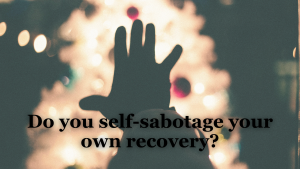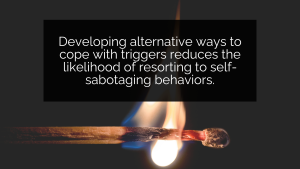Do you self-sabotage your own recovery and not even know it?
For many individuals in recovery, self-sabotage can be a significant obstacle on the path to healing. Self-sabotage manifests in various forms, from negative self-talk, lack of self-worth, destructive behaviors, and everything in between.
But, fear not, there are strategies and techniques to overcome self-sabotage and pave a way for a fulfilling life in recovery.
What is self-sabotage?
According to the Oxford Dictionary, “the act of destroying or damaging something deliberately so that it does not work correctly.” Self-sabotage is a damaging form of behavior that holds an individual back from their progress. It is destructive to relationships, delays your recovery, and creates significant consequences.
Why does someone self-sabotage?
This can be for many reasons of carelessness or recklessness; consciously or unconsciously. For some, it becomes a repeated behavior to the point, they may not even realize they’re doing it. The motives vary from lack of self-worth – not feeling worthy enough for a healthy life of sobriety; to insecurity or fear – losing friends, fear of the unknown, and insecure of how to maintain the life of recovery.
What are the signs of self-sabotage?
Common indicators include:
- Negative self-talk: Constantly criticizing oneself and doubting one’s abilities can erode self-esteem and hinder progress in recovery.
- Procrastination: Delaying important tasks or avoiding challenges out of fear of failure can sabotage efforts towards sobriety.
- Isolation: Withdrawing from supportive relationships and activities that promote wellness can exacerbate feelings of loneliness and isolation.
- Engaging in Destructive Behaviors: Resorting to substance use or other harmful behaviors as a coping mechanism to deal with stress or emotional pain can derail recovery efforts.
At Second WakeUp House and Redemption Place, we value the Faster Scale, which shows indicators when someone is slipping in their recovery. It’s a helpful resource of signs to look out for. We have several printed throughout the houses as reminders to help stay and track.
Be on the lookout for these behaviors. In your recovery journey to move forward, this matters.
Learn to embrace growth and resilience by implementing strategies. Here are 7 actionable steps to apply:
1. CULTIVATE SELF-COMPASSION: Replace self-criticism with self-compassion. Treat yourself with kindness and patience, acknowledging that recovery is a journey filled with ups and downs.
2. CHALLENGE NEGATIVE BELIEFS: Identify and challenge negative beliefs that fuel self-sabotage. Replace them with positive affirmations and empowering thoughts.
There are many scriptures you can meditate on that will fill your mind with positive affirmations and self-worth.
3. SET REALISTIC GOALS: Break down your goals into manageable steps and celebrate small victories along the way. No reason to do everything all at once. Take your time; this builds confidence and momentum in sobriety.
4. SUPPORT NETWORK: Don’t hesitate to reach out to a therapist, counselor, or a sponsor for additional support. They can provide valuable insight and tools to address underlying issues contributing to self-sabotage.
5. PRACTICE MINDFULNESS: Cultivate mindfulness through prayer, deep breathing, or exercising. Being present in the moment will hep you observe and detach from negative thoughts, emotions, or destructive coping mechanisms.
6. DEVELOP COPING SKILLS: Learn healthy coping habits to manage stress and cravings, such as exercise, hobbies, or journaling. Journaling seems intimidating? Find easy journaling tips here. Developing alternative ways to cope with triggers reduces the likelihood of resorting to self-sabotaging behaviors.
7. COMMUNITY: Surround yourself with positive influences and seek support from people who encourage your sober lifestyle. Sharing your struggles with others who understand can provide valuable perspective and encouragement. There are incredible benefits to sober living.
DEVELOPING ALTERNATIVE WAYS TO COPE WITH TRIGGERS REDUCES THE LIKELIHOOD OF RESORTING TO SELF-SABOTAGING BEHAVIORS
Recovery is not linear, and setbacks are part of the journey. You can begin implementing these strategies to navigate the challenges for growth and resilience. Each obstacle you overcome strengthens your resolve and deepens your commitment to sobriety. Remember that you are worthy of a fulfilling and sober life.
Overcoming self-sabotage in sobriety requires self-awareness, dedication, and a willingness to embrace change and new behaviors. By implementing these strategies, such as cultivating self-compassion, challenging negative self-beliefs, and community support, you can navigate the challenges of recovery with resilience and hope. Remember you are not alone on this journey, and with the right tools and mindset, you can conquer self-sabotage and live a fulfilling life free from addiction.
For more inspiration, be sure to follow us on Instagram, Facebook, or Pinterest.
Sign up for our bi-weekly Newsletter:
